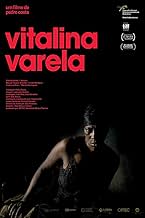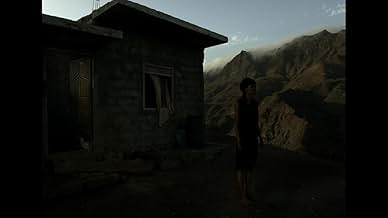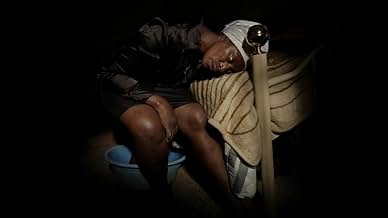IMDb-BEWERTUNG
6,7/10
2588
IHRE BEWERTUNG
Eine kapverdische Frau versucht, in Lissabon den spärlichen physischen Spuren ihres drei Tage vor ihrer Ankunft verstorbenen Mannes zu folgen, und entdeckt sein geheimes, illegales Leben.Eine kapverdische Frau versucht, in Lissabon den spärlichen physischen Spuren ihres drei Tage vor ihrer Ankunft verstorbenen Mannes zu folgen, und entdeckt sein geheimes, illegales Leben.Eine kapverdische Frau versucht, in Lissabon den spärlichen physischen Spuren ihres drei Tage vor ihrer Ankunft verstorbenen Mannes zu folgen, und entdeckt sein geheimes, illegales Leben.
- Regie
- Drehbuch
- Hauptbesetzung
- Auszeichnungen
- 24 Gewinne & 30 Nominierungen insgesamt
Empfohlene Bewertungen
I came to Pedro Costa's 'Vitalina Varela' with quite high expectations. Its expressionism, artistic camera work and oddly-staged lighting (filmed initially in the pitch darkness of night, objects and faces duly highlighted, gradually easing towards daybreak and sunlight) are dashed by a painfully slow story delivered by actors who barely move. Social realism is one thing, most scenes are apparently shot in slum places with non-professional actors, but having people who can act and a dialogue beyond meandering prose is surely the way to go. Even art shouldn't be this painful!
For over two hours in what might as well be catacombs, we watch humans
walk like zombies in slow motion, or staring into space unmoving, hardly saying a word, except for whispered voice overs so as not to disturb the dark.
After a 20-year separation a woman arrives to join her husband but he was
buried three days before. That's about the extent of the story. About the only action is watching people smoke for lack of anything to do.
Everyone's miserable and pining for the good old days. The priest when he used to have a full house (though he can still pay for the funeral and everyone's bills). The woman when she was young and active. We don't know who the other characters are. Finally, we get to see the light of day. But turns out it's a
flashback to when the young couple built their house.
So the only hope is to live in the past, as there is no present or future?
I watched this movie praised by most critics for its beauty. And it is a beautiful shot movie because of mis-e- scene, acting, lightning and camera. It is all superb in its self inflicted-limitations. Very simple mis-en=.scene and dressing of mostly very poor slum interiors, all shot at night. Fascinating acting of the woman Vitalina who's face is so great to look at in the many close ups. The lightning which makes with its claire obscure and brilliant color accents everything into a Carravagio painting. And the camera which chooses always a fixed cadre like a painting and gets the light and colors in a subtle way. There is hardly a story cause there is no development. It is more the depiction of the failed life of the just died husband of Vitalina, told to us through her eyes, her monologues, searching for details and questions to the priest who buried him. In one scene the husband is shown seen on his slender young naked back lying in the matrimonial bed still in Cabo Verdi. The now young wife Vitalina stands up and walks out of their self build house into a beautiful but dry landscape.
The general theme of the movie is the misery of life in general and that of Cabe Verdian migrant workers in particular. My question watching the movie was and is what is the function of all this beauty, what is it for? Is it to show that allthough life is miserable the figures in this movie experience it as beautiful? The answer is negative cause they are desperate in their life and see no light. Is the beauty meant to soften our experience of viewing all this malheur? Of course it does. How to watch so much ugliness for such a long time if there is not something nice to be seen? It has that softening and pleasurable effect but it is not the main function of all this esthetica . I think the function is deeper. Is it l'art pour l'art: beauty for beauty sake? Maybe but what does that mean here? I think that in a religious way we are shown the deep humanity of all these unlucky and unhappy people and the possibility to reconcile ourselves through this beauty with human life. At least I think it is meant that way by the maker of the movie. Did it work that way with me? In a way yes but not in a satisfactory way. Maybe that's my fault.
You need to work hard at a Pedro Costa movie. His films are not for those who like speed or action or even need to see what's going on. Though shot in colour his films are more black on black and the greens, purples, blues and reds that intrude during the opening moments of his latest film, "Vitalina Varela" come as something of a shock. Otherwise, it's business as usual. Costa aficionados will love this but if, like me, you find his work 'difficult' you won't find much here that's different. My problem with Costa isn't the dark cinematography or the slow pace but the sense that everything is staged in an unreal world that we are meant to accept as 'realistic'. Costa's films are like theatrical productions in which the actors say very little and just wander around the stage though to be fair, "Vitalina Varela" is beautifully shot; darkness has never seemed more tangible.
The title character, Vitalina Varela, is a Cape Verdean woman who travels to Lisbon after the death of her husband, perhaps to set his affairs in order, perhaps just to find out more about the man who abandoned her. Vitalina Varela also happens to be the name of the actress playing her and, although she has only appeared in this and one other Costa picture, must surely be considered an actress, (she did win Best Actress at Locarno), and not just the character she is 'playing'. But then Costa likes to cast people in his films playing people who may or may not be variations of themselves. He likes to blur the lines between fact and fiction and he does so very, very slowly though certainly with a degree of skill.
There are people who swear by his films, (others may swear at them); people who see in Costa a new kind of film-maker, a saviour of the cinema in an age of paltry, mindless 'entertainments' where even the new 'art-house' directors like Claire Denis and Bruno Dumont are selling out but to quote a certain Miss Jean Brodie, 'for those who like this sort of thing, this is the sort of thing they like'. I have no doubt cineastes amongst my readers will already be picking up their brickbats to hurl at me for not loving this but hopefully not too many will have seen it and I will live to review another day.
The title character, Vitalina Varela, is a Cape Verdean woman who travels to Lisbon after the death of her husband, perhaps to set his affairs in order, perhaps just to find out more about the man who abandoned her. Vitalina Varela also happens to be the name of the actress playing her and, although she has only appeared in this and one other Costa picture, must surely be considered an actress, (she did win Best Actress at Locarno), and not just the character she is 'playing'. But then Costa likes to cast people in his films playing people who may or may not be variations of themselves. He likes to blur the lines between fact and fiction and he does so very, very slowly though certainly with a degree of skill.
There are people who swear by his films, (others may swear at them); people who see in Costa a new kind of film-maker, a saviour of the cinema in an age of paltry, mindless 'entertainments' where even the new 'art-house' directors like Claire Denis and Bruno Dumont are selling out but to quote a certain Miss Jean Brodie, 'for those who like this sort of thing, this is the sort of thing they like'. I have no doubt cineastes amongst my readers will already be picking up their brickbats to hurl at me for not loving this but hopefully not too many will have seen it and I will live to review another day.
Superb use of sound and camera, fascinating performances. My first Pedro Costa film--what a joy to view it. Reminded of Sokurov's "Mother and Son"--had he made it, it would be probably titled "Wife and Husband." This Pedro Costa film is definitely one of my best 2019 films. Winner of Golden Leopard and the Best Actress awards at Locarno film festival. Well deserved!
Wusstest du schon
- WissenswertesOfficial submission of Portugal for the 'Best International Feature Film' category of the 93rd Academy Awards in 2021.
- VerbindungenSpin-off from Horse Money (2014)
Top-Auswahl
Melde dich zum Bewerten an und greife auf die Watchlist für personalisierte Empfehlungen zu.
- How long is Vitalina Varela?Powered by Alexa
Details
Box Office
- Bruttoertrag in den USA und Kanada
- 14.941 $
- Eröffnungswochenende in den USA und in Kanada
- 4.612 $
- 23. Feb. 2020
- Weltweiter Bruttoertrag
- 56.860 $
- Laufzeit2 Stunden 4 Minuten
- Farbe
- Seitenverhältnis
- 1.33 : 1
Zu dieser Seite beitragen
Bearbeitung vorschlagen oder fehlenden Inhalt hinzufügen

Oberste Lücke
By what name was Vitalina Varela (2019) officially released in India in English?
Antwort



















